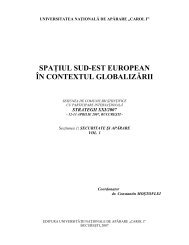PROVOCĂRI LA ADRESA SECURITĂŢII ŞI STRATEGIEI LA ÎNCEPUTUL SECOLULUI XXI
provocări la adresa securităţii şi strategiei la începutul secolului xxi
provocări la adresa securităţii şi strategiei la începutul secolului xxi
Create successful ePaper yourself
Turn your PDF publications into a flip-book with our unique Google optimized e-Paper software.
- Russian Duma has not yet ratified 1990 Maritime Boundary<br />
Agreement with the US in the Bering Sea.<br />
Russia and the Black Sea Region - security facts<br />
Strategic importance of the Black Sea region in the nearest future<br />
will constantly grow [19]. The new independents states former Soviet<br />
republics from Black Sea were confronted with separatist movements<br />
encouraged and actively supported by Russian forces.<br />
The Russian troops (units of the former Soviet) dislocated in these<br />
republics provoked interethnic conflicts, then they supported the separatist<br />
movements which were favorable to the strategic interests of Russia, and<br />
when the conflict reached dangerous escalation they turned into<br />
peacekeeping forces, Under the protection of Russia troops, separatist<br />
movements emerged in Georgia (Abkhazia, South Ossetia), Republic of<br />
Moldova (Transnistrian Moldavian Republic) and Ukraine (Crimea attempt<br />
could not be undertaken because resorting to military violence would have<br />
been a too dangerous venture). When the separatist reached their „minimal”<br />
goals (self-proclaimed „republic”), the cease-fire was imposed and, in spite<br />
of the fact that they could not obtain official recognition from international<br />
community, they continue to maintain their „states” under the protection of<br />
the Russian troops - now peacekeeping forces - who are separating the legal<br />
forces of the separatists’ armed bands.<br />
Russia is interested both in participating in the exploitation of these<br />
and in their transportation towards Central Europe through its own pipelines<br />
[20]. Russia has become more assertive in its relations with many of the<br />
countries that formerly made up the Soviet Union [21]. The pressure exerted<br />
on Georgia through the separatist regimes there, unilateral efforts to resolve<br />
the Transnistrian conflict in Moldova and heated rhetoric directed at certain<br />
of the Baltic States have caused concern. Also, the spat with Ukraine<br />
involving Tuzla Island and the Kerch Strait last fall [22].<br />
The United States recognize that Russia has significant interests in<br />
the region. The United States has significant interests in the region, too [23].<br />
The fulfillment of the outstanding Istanbul commitments on<br />
Georgia and Moldova will create the conditions for Allies and other States<br />
Parties to move forward on ratification of the Adapted CFE Treaty [24].<br />
Turkey<br />
The Black Sea is actually dying. Eighty per cent of the pollution in<br />
the Black Sea comes from the Danube waterway [25].<br />
291<br />
The Turkish Caspian-Mediterranean oil pipeline project is widely<br />
considered to be the most economical, secure and environmentally friendly<br />
scheme to route Caucasian oil to Western markets.<br />
Turkey is frontline country with its own process of domestic<br />
democratization and modernization. In the absence of this democratization:<br />
1) Turkey lacks the political resources necessary for a durable normalization<br />
of relations with Greece; 2) Turkey fails to assimilate the European<br />
standards; which condition its way out of the present ambiguity in the<br />
relations with the EU and its so much needed integration into the European<br />
Union; 3) Turkey cannot provide itself internal security unless it is able to<br />
offer its own citizens (including and especially those belonging to national<br />
minorities) a better alternative than choosing between “military democracy”<br />
(unavoidable limited and authoritarian) and Islamic fundamentalism (with<br />
Kurdish separatism as a sub-variant).<br />
Figura 9 Turkey<br />
Security problems:<br />
Complex maritime, air, and territorial disputes with Greece in the<br />
Aegean Sea.<br />
Cyprus question remains with Greece.<br />
Syria and Iraq protest Turkish hydrological projects to control upper<br />
Euphrates waters.<br />
Turkey has expressed concern over the status of Kurds in Iraq.<br />
Border with Armenia remains closed over Nagorno-Karabakh.<br />
292 Turkey is NATO’s membership.



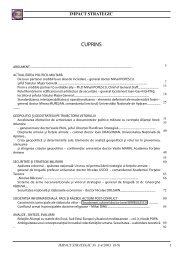

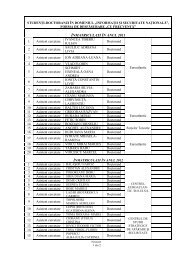
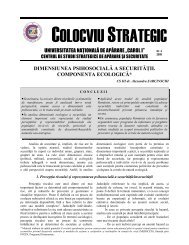
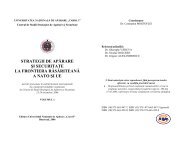
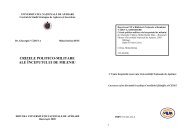
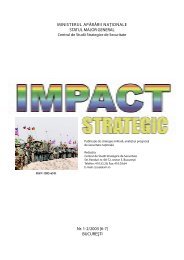



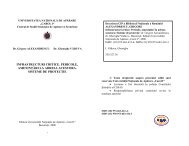
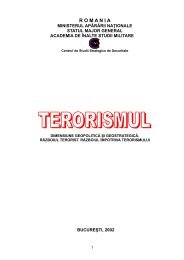

![„CAROL Nr 4 [29]/2008](https://img.yumpu.com/53801719/1/184x260/carol-nr-4-29-2008.jpg?quality=85)
